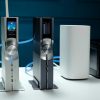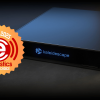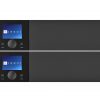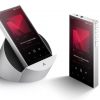Sonus faber has been manufacturing loudspeakers in Italy for almost four decades (2023 will be its 40th anniversary), and the luxury brand started by the late-Franco Serblin has preserved its reputation for manufacturing the world’s most beautiful loudspeakers with great skill. Sonus faber’s loudspeakers are aspirational products for many audiophiles for both their visual appeal and acoustic capabilities. The Sonus faber Lumina 1 continue that tradition at a much more affordable price.
I have long held the belief that audio components reflect the culture of the people behind them; the Italian obsession with design, craftsmanship, beauty, and quality is reflected in many of the products that are produced by brands like Audio Analogue, Opera, Gold Note, Unison Research, and Sonus faber.
I know many audiophiles who search the audio classified pages for classic Sonus faber designs on a weekly basis; hoping to find a mint pair with their matching stands albeit at a premium price. Quality comes at a price and that reality has placed Sonus faber loudspeakers out of reach for many audiophiles; the retired “Toy” collection from 2008 was the first attempt at offering affordable designs, which if memory serves me fell somewhat flat.

Lumina I Bookshelf Speakers
Lumina III Floorstanding Loudspeakers
Lumina CI Center Speaker
The brand new Lumina collection (Lumina I, Lumina III, and Lumina CI) are a concerted attempt to bring the artistry of Sonus faber to a much wider audience for a lot less money. The Lumina I 2-way bookshelf loudspeakers ($899.00/pair) are not a mere taste of the Italian manufacturer’s design and manufacturing capabilities, but a full-blown meal with a satisfying Torta caprese for dessert to make sure you don’t go to bed on an empty stomach.
Italians know how to eat. And make great loudspeakers.
The Skinny on the Sonus faber Lumina 1
One of the most unique design aspects of early Sonus faber designs was the use of leather on the front baffle; a detail the Lumina I forgo for a leather-wrapped enclosure instead that looks especially striking with the Wenge-finished (real wood veneer) multilayer front baffle. The Lumina collection are available in Walnut, Piano Black, and Wenge – the magnetic grille covers should be left in the box for both sonic and aesthetic reasons. There are two sets of binding posts on the rear panel for bi-wiring or bi-amping.
The range uses Sonus faber’s DAD (Damped Apex Dome) tweeter – the same used in the company’s more expensive Sonetto series – featuring a Kurtmueller hand-coated soft-silk 2.9 cm diaphragm.

The Lumina I utilize a brand new 4.72” paper cone midrange/woofer manufactured from cellulose pulp that is blended with other natural materials.
The Lumina I buck the recent trend of “oversized” bookshelf loudspeakers (11”H x 5.8”W x 8.4”D) like the Klipsch RP-600M, Wharfedale EVO 4.2, and Q Acoustics 3030i; something that might make them more appealing to those who don’t want the added expense of dedicated stands and would prefer to place them on a credenza or actual bookshelf.
The front reflex port was a smart choice as it allows the Lumina I to be positioned closer to the wall behind it; not that this loudspeaker is capable of overloading too many listening spaces with its bass response; the Lumina I are rated at 65 Hz – 24,000 Hz (84 dB, 4 ohms).
The low sensitivity rating might raise a few eyebrows; it certainly encouraged me to try the Lumina I with a wide range of amplifiers including the Naim Uniti Atom, NAD C 316BEE, Cambridge Audio AXA35, Croft Phono Integrated, and Cambridge Audio Edge A.
Very few consumers are likely to use something like the $6,000 Edge A with a $900 bookshelf loudspeaker but the little Italian most certainly liked the kind of control that the brutish Edge A can deliver. You don’t need to punish the Lumina I with 200 watts of solid-state power to hear what it can do – but it preferred more vs less in most cases.

The Sound
The Lumina I arrived at the same time as the NAD C 588 turntable (also reviewed) which includes a pre-installed Ortofon 2M Red MM cartridge; the top end of this cartridge has driven me crazy for years (not in a good way unless the phono pre-amplifier on the other end is rolled off at the top) and I was curious how It would interact with the loudspeaker’s tweeter.
Freddie Hubbard’s Hub-Tones (Blue Note Records 80 Vinyl, ST-84115) is a remarkably solid reissue and great test for tone, pace, and top end extension. Hubbard’s trumpet blazes on this album featuring Herbie Hancock on piano – the Lumina I (cold out of the box) delivered silky smooth extension on top and above average color in the midrange. With daily use, the midrange began to open up and hit its stride after about 20 hours of playing time.
Having listened to the album in the days prior on my office system through a pair of Q Acoustics 3050i driven by the NAD C 316BEE (Thorens TD-145/Dynavector 10×5 HO MC/Pro-Ject Tube Box DS2), the Lumina I lacked the low end punch of the larger 3050i but had superior treble performance; a terrific sense of bite without having to reach for the volume control.
There was some definite restraint to the sound initially with vocals and it took some hours and a change of amplifier (Croft, Cambridge Edge A) to unleash what is a genuine strength of the loudspeakers.

Vocals can really shine through the Lumina I, but you need to find the right balance with your amp and sources. I would not go with anything too laid back on the amplification side. The woofer benefits from some control if you want to maximize its limited low-end performance.
The NAD C 316BEE has the right tonal balance for the Lumina I but one might have to turn up the volume to really hear just how large these 2-way bookshelf loudspeakers can sound.
The Naim Uniti Atom had the trademark Naim swagger but felt underpowered with the loudspeakers. The simplicity of the Lumina I and Naim network amplifier make it an appealing system but not very economical (the Naim is 3x the price of the loudspeakers).
Placed six feet apart on a dining room credenza (a realistic scenario for some people), the Lumina I disappeared in a convincing fashion with most well-recorded music streamed via Qobuz and I found myself listening to more and more music as I worked at the dining room table.
Are the Lumina I loudspeakers I would recommend cranking as loud as you can with Slayer? Not really.
But will they reward listeners who put some thought into amplifier/source and deliver an emotional performance that is warm, engaging, and detailed enough to keep you listening with zero fatigue for hours?
Looking for a great system to build around the Sonus faber Lumina 1? We have a suggestion that you might want to strongly consider.
Dinner is served. Bellissima Sonus faber. Bellissima.
For more information: Sonus faber Lumina I Loudspeakers

































James F Tremblay
May 9, 2021 at 11:55 am
I know I’m an oddball in this arena, but I think SF is one of the uglier speakers in the marketplace, and always have. The only pair I ever tried were Chamelions and was singularly unimpressed. But as I recall, that speaker didn’t have all that many fans anyway. Sorry, SF – I’ll hang with the Brits for my speakers.
Ian White
May 9, 2021 at 12:32 pm
James,
The earliest Sonus Faber speakers like the Concertino and Electa Amator were really something up close. The woodwork was second to none.
I’m a British speaker person myself but the Lumina 1 are really quite impressive.
Alok Jolly
October 17, 2021 at 5:27 pm
Amazing stuff… Like the finish and sound quality.